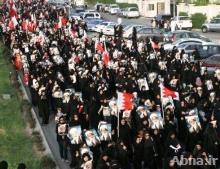(Ahlul Bayt News Agency) - Thousands of people in Bahrain have taken to the streets south of Manama to protest against the regime’s repression of the opposition.
The demonstrators marched in the area of Bilad al-Qadim on Friday, waving national flags and chanting slogans calling for the release of jailed opposition activists.
Meanwhile, the main opposition group, al-Wefaq movement, issued a statement condemning "the continuing arrests, political trial and discrimination" against the country’s Shia majority.
It also criticized the Al Khalifa regime for failing to implement the recommendations of the Bahrain Independent Commission of Inquiry (BICI), which was tasked with probing the incidents around the crackdowns in February and March 2011.
In February 2011, Bahrain was rocked by mass protests demanding elections and democratic reforms. But the pro-reform movement was faced with an iron fist and the demands of a constitutional monarchy soon turned into calls for the fall of ruling Al Khalifa family.
On March 14, 2011, troops from Saudi Arabia and the United Arab Emirates stepped in upon a request from Manama to assist the Bahraini regime forces in its crackdown on the popular protests.
In November 2011, the BICI released a 500-page report which documented 46 deaths, 559 allegations of torture, and more than 4,000 cases of employees dismissed for participating in protests.
The report said during the regime’s crackdown, “force and firearms were used in an excessive manner that was, on many occasions, unnecessary, disproportionate, and indiscriminate.”
It also confirmed the Bahraini government's use of systematic torture and other forms of physical and psychological abuse on detainees, as well as other human rights violations.
/129
The demonstrators marched in the area of Bilad al-Qadim on Friday, waving national flags and chanting slogans calling for the release of jailed opposition activists.
Meanwhile, the main opposition group, al-Wefaq movement, issued a statement condemning "the continuing arrests, political trial and discrimination" against the country’s Shia majority.
It also criticized the Al Khalifa regime for failing to implement the recommendations of the Bahrain Independent Commission of Inquiry (BICI), which was tasked with probing the incidents around the crackdowns in February and March 2011.
In February 2011, Bahrain was rocked by mass protests demanding elections and democratic reforms. But the pro-reform movement was faced with an iron fist and the demands of a constitutional monarchy soon turned into calls for the fall of ruling Al Khalifa family.
On March 14, 2011, troops from Saudi Arabia and the United Arab Emirates stepped in upon a request from Manama to assist the Bahraini regime forces in its crackdown on the popular protests.
In November 2011, the BICI released a 500-page report which documented 46 deaths, 559 allegations of torture, and more than 4,000 cases of employees dismissed for participating in protests.
The report said during the regime’s crackdown, “force and firearms were used in an excessive manner that was, on many occasions, unnecessary, disproportionate, and indiscriminate.”
It also confirmed the Bahraini government's use of systematic torture and other forms of physical and psychological abuse on detainees, as well as other human rights violations.
/129

